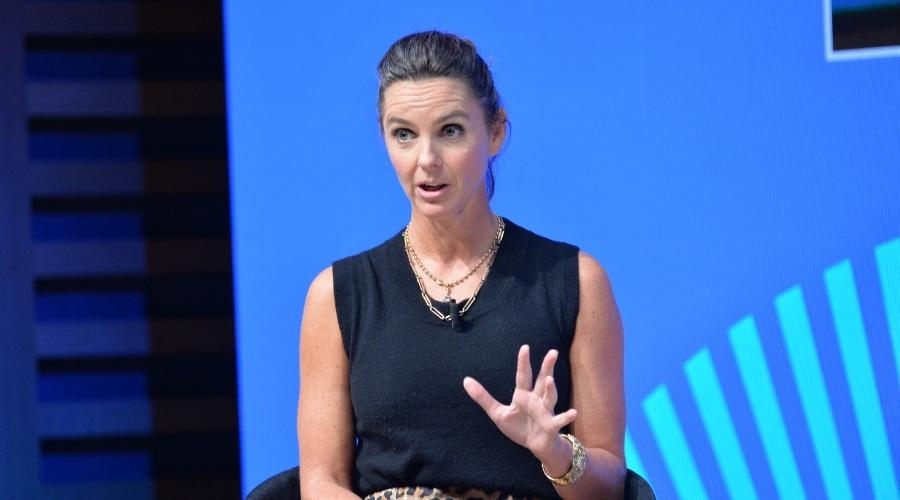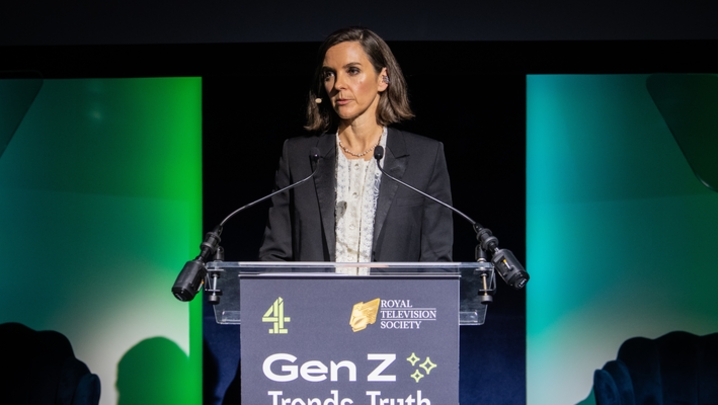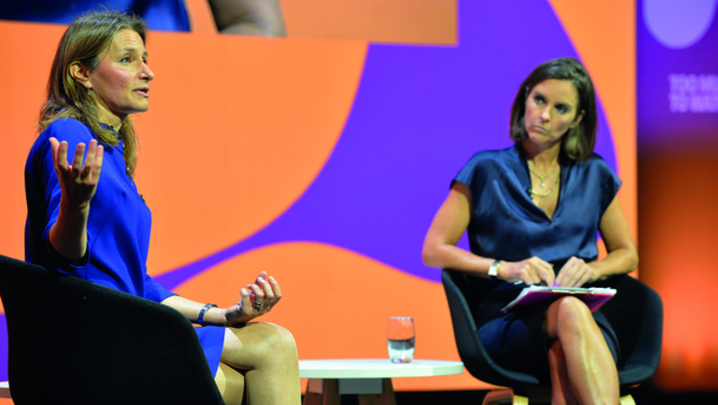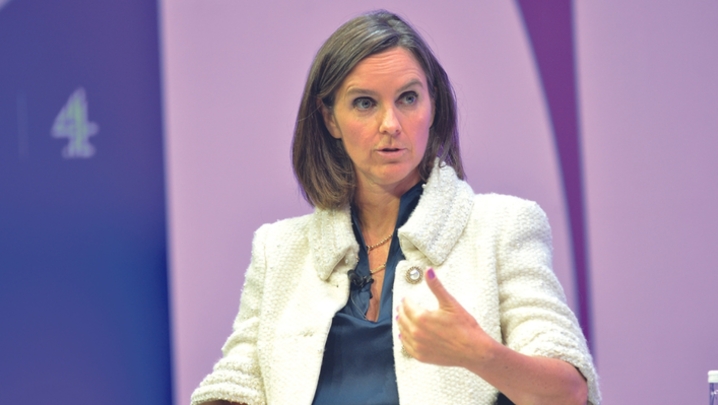Channel 4 Chief Executive Alex Mahon explains how the broadcaster is protecting its unique remit in uncertain times.
Session chair Amol Rajan: Did you interpret the new culture secretary saying that she is re-examining the business case for privatisation as implying that she and Prime Minister Liz Truss are not as committed to privatisation as their predecessors?
Alex Mahon: We’re in discussion with the DCMS about where they want to end up and what the options are. I imagine they’ll look at the things that I like: facts, data and evidence. Then we’ll see what the coming weeks and months hold as they think about that.
Lots of things in the legislative agenda are in the air compared with where we were in July, partly because the country is now having some more problems.
What has been the impact on the regulation of British media of having so many secretaries of state in the past five years?
We have really good civil servants in that department; they tend to be in their jobs for longer, and they do know the sector in detail – that does make a difference. And we have Ofcom and other stakeholders.
I don’t think it’s perfect that we have such rotation because it is hard for people to get to know all the broadcasters and other players in the industry. That said, they tend to do a really focused job and think about what the right answers are.
Even if privatisation doesn’t happen, hasn’t the whole process been good for you, as it has forced you to think about what you’re for and make some quite useful changes?
I don’t think you’re wrong, but also it hasn’t been easy. It’s been volatile but, in a way, Channel 4 is at its best when our backs are against the wall. We’ve had our best results ever: we made £100m surplus last year, we had an amazing year with All 4. In that sense, volatility and ambiguity have perhaps made us perform better. But it would also be nice to know where we are.
One of the things that you proposed was a £100m joint venture with outside private financing, which would have been the first time that you allowed private financing into Channel 4. Are you still looking to create such a joint venture?
We had lots of ideas of how could we raise external capital, which was one of the Government’s questions in the consultation. When we have resolution to where we are, we’ll look at all of those [ideas] again. It’s hard for us to launch a lot of [them when] it’s unclear, because, if we’re bringing in external partners and external capital, they want to know you’re in a fixed position for a bit of time.
If you did go down that route, isn’t there potentially a tension between the intentions of a private investor and your public service remit?
Not in the way we structured it… they were a minority. So I don’t think that would be a problem.
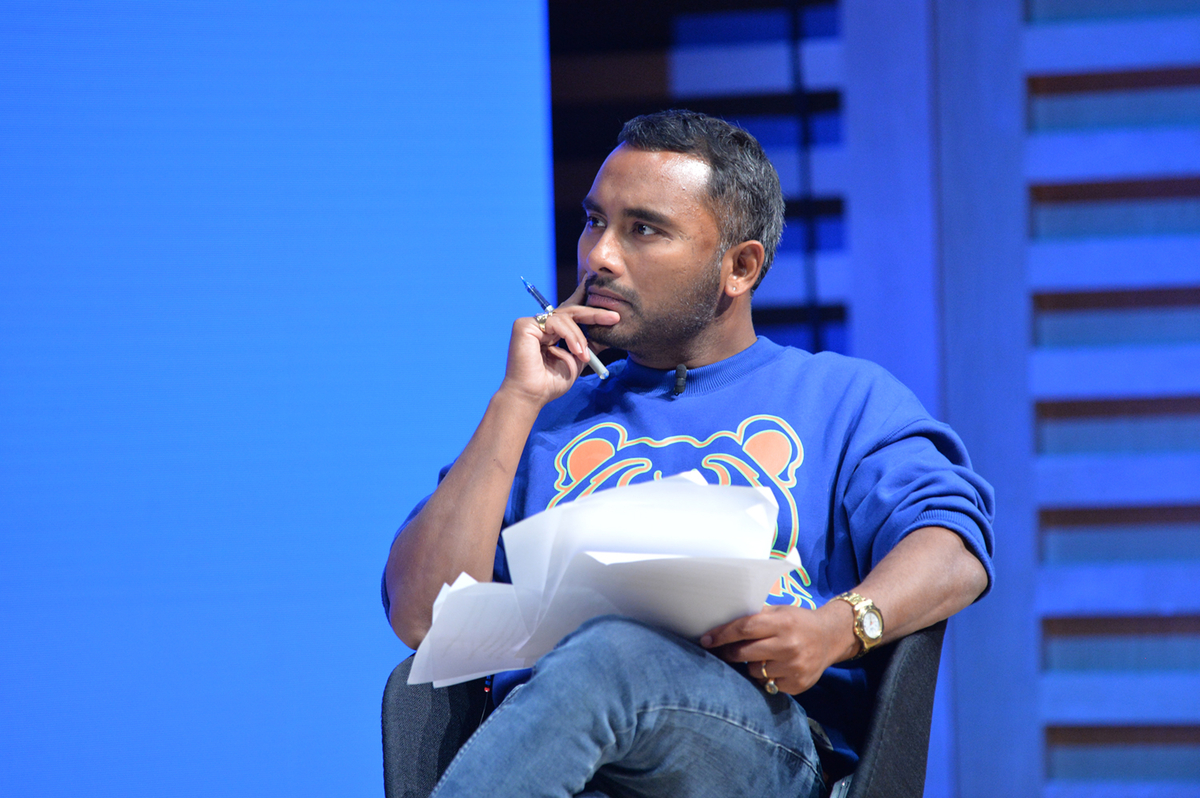
Last year, you had record revenues. [But] we are possibly in a recession and you are funded by advertising. How bad will it get for Channel 4?
On advertising, nobody knows yet. It’s a pretty volatile market – I haven’t checked since we came on stage what’s happened to sterling. So that’s hard to predict.
The other truth is that people want to watch things with ads in them because they’re free. The previous panel [on winning in the “attention economy”] was about whether people would keep paying for lots of different SVoD services, or would start cutting back because they can’t afford them. Whereas, it turns out that people still like free.
That’s why broadcasters with advertiser-funded VoD will continue to do well, and it’s why you see some of those SVoDs piling into an advertiser-funded tier.
How many years do you think it will be before a digital viewer is worth as much to Channel 4 as a linear viewer?
For us, someone watching on All 4 is worth the same as someone watching on linear television. It’s completely different to what happened in print.
The questions for us are about how fast you manage that transition. It’s not an easy linear equation – if you get one more person in VoD viewing, you don’t get one less person in linear. So how you prioritise each of those services is a series of complex operational decisions.
If we look at release patterns, a year or two ago, everything was released as a box set on SVoD services. Now, we see them moving closer to broadcast, with weekly drops of shows to keep interest high. We see them moving into advertising, just like us. We see them moving into live sports, just like us. We are yet to see how the market will settle in terms of what we give to consumers and how we give it.
When Her Majesty The Queen died, what was your approach, creatively?
We did all the right things. Like the other broadcasters, we did the announcement correctly, our news team was absolutely spectacular. We did make complex choices, like we put Gogglebox back on Friday night, which was actually really welcomed by the public. Those are the things that we have to consider, being an alternative.
We had to strip all the ads out. That’s a really complex operational task. On the funeral day, we didn’t put the funeral on; we put on a wonderful documentary about the coronation of the Queen, narrated by Laurence Olivier. There weren’t a lot of people watching that, I must admit, but it was an important version of what the Channel 4 point of view was. Doing something that was respectful was the right place for us to be.
You’re making a big push on skills through this initiative 4Skills, and you’re looking to focus additional investment on young people from non-professional backgrounds. Can you explain what you’re doing to help working-class kids?
4Skills, which we’ve already launched, reaches 15,000 young people a year. It is completely focused on people who would not otherwise be given a chance in the industry.
We’re working with all kinds of young people, with all the sets of underrepresented people, with apprentices, with different agencies, and we go into schools. That’s already up and running, and it’s a massive success.
In our document, we suggested that we accelerate that even more, and play an even bigger role outside London. It does make an amazing difference if you can have a career in our industry without having to move to London.
The BBC now gathers and is soon to publish the socio-economic make-up of its staff. Would you be prepared to do the same?
Yes, and we are already at about 37% or 38% from working-class and intermediate [backgrounds]. We’ve got a big inclusion piece coming up.
The bigger difficulties are not necessarily about changing the numbers in an organisation. What you want is a place of work where you feel comfortable in not necessarily being the same as the people who came in before or are at the top echelons of the organisation. If you look at those surveys, the gap between who you really are and who you pretend to be at work is much bigger if you come from a working-class background.
In Session Three, ‘UK keynote: Alex Mahon’, the CEO of Channel 4, was interviewed by BBC journalist Amol Rajan. The producer was Sue Robertson. Report by Shilpa Ganatra.

